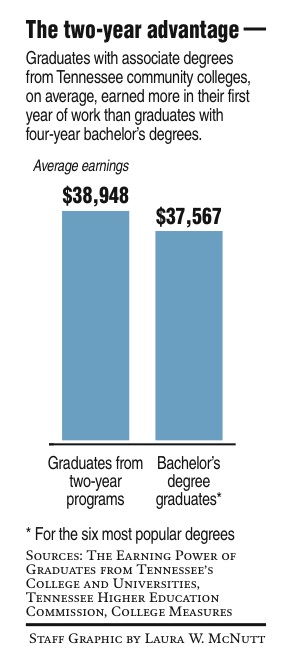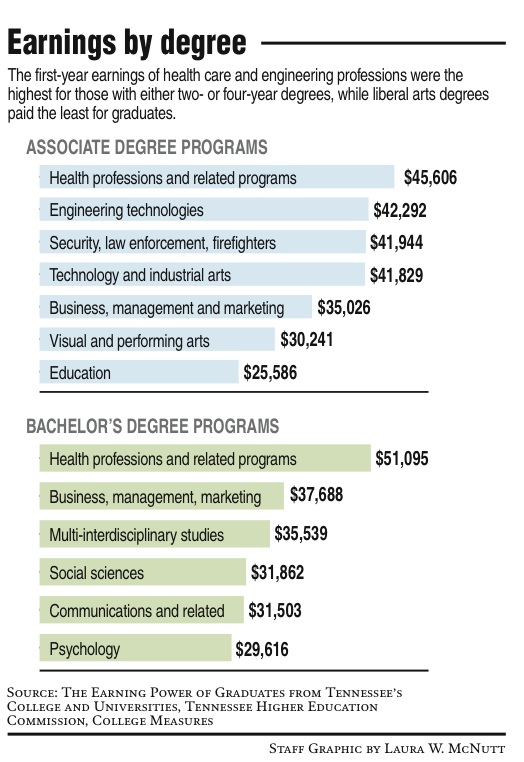Sophomore Ben Fischer wants to pursue psychology.
His older brother, UTC senior Will Fischer, dreams of opening his own business after he gets his accounting degree.
"That's what I'm going for, a college education," the older brother said.
But a new study shows that both of them might be better off in the health care field. They would make more money right away, save two extra years of their lives and spend less on education.
The report, sponsored in part by Tennessee's taxpayers, shows that graduates with associate degrees earned $1,000 more on average in their first year than those who stayed in school for two extra years.
The University of Tennessee at Chattanooga scored lowest in graduate earnings among Tennessee's four-year schools, according to the study, with UTC grads making thousands less in their first year than graduates of two-year programs at Chattanooga State Community College and Cleveland State Community College.
For instance, a psychology graduate averages just $29,616 in his first year out of a four-year school, while a security guard with a two-year degree earns an average of $41,944, according to the study by the Tennessee Higher Education Commission, the state Department of Labor and Workforce Development and nonpartisan College Measures.
A four-year bachelor's degree in journalism yields an average starting wage of $31,503, while a construction tradesman with a certificate from Nashville State Community College earns an average of $66,444, the study shows.
"If a student has a passion for a particular field, well, I guess I'd go along with everybody else and say follow your passion," said Jim Catanzaro, president of Chattanooga State. "On the other hand, they have to do it knowing what the probabilities are of employment."
Four-year graduates in popular liberal art fields of study such as psychology, history, philosophy and literature scored the worst on first-year earnings -- between $20,458 and $27,094 on average. Business and management graduates with a four-year degree did slightly better, averaging $37,688.
That's assuming they can even find a job.
Many students now enrolled at Chattanooga State already have four-year degree, but are pursuing additional technical certificates or associate degrees, Catanzaro said.
"Now they're in engineering because they learned after they got the first degree they couldn't get a job," he said.
The study found that health care degrees yield the highest-paying jobs -- no matter how many years it took graduates to earn the degree.
Graduates in health care earn more than $50,000 in their first year with a bachelor's degree, according to the report. Even a health care certificate, which is easier to get than an associate degree, can earn an average starting salary of $42,538.
Victoria Dye, who is studying biology at UTC, plans to become a trauma surgeon after she finishes graduate school. She knows it's going to take years and she also knows she could make $35,000 within the next seven weeks if she enrolled in a truck-driving program at Chattanooga State.
But her mind is made up to pursue medicine.
"That's just what I want to do," she said.
UTC freshman Sean Putnam, despite being new to college, already has seen the writing on the wall for some of his fellow students. They spend years studying history, their life's dream, then end up serving fast-food meals.
"There are a ton of people who get a degree in one thing and then they do something completely different," he said.
That's because traditional college simply isn't for everybody, despite society's protestations to the contrary, said Bryon Barkley.
Barkley, a senior who is studying religion and anthropology, grew up in an environment in which a liberal arts education was treated as a natural extension of high school.
"Oh, I finished high school, what do I do now? I go to college," he said. "We pretend as if everybody needs a liberal arts education, but they don't."
Barkley likely will make less than $27,000 a year after he graduates, according to the study. But he could make a lot more later in his career. For instance, if he gets a job as an industrial psychologist for a large corporation, he could quickly double his salary.
That's why the traditional college experience remains important, said Chuck Cantrell, associate vice chancellor for communications and marketing at UTC.
"The data is pretty clear that individuals with college degrees earn more over the lifetime of a career," Cantrell said.
The Bureau of Labor Statistics found in 2011 that unemployment decreased to 4.9 percent among graduates with a bachelor's degree, down from 6.8 percent among graduates with an associate degree. Median weekly earnings increase to $1,053 for bachelor's degree graduates versus $768 for graduates with an associate degree.
UTC tries to be "very open and honest with students," Cantrell said, coaching them through the process of matching up their expected standard of living with their life's passion.
"Obviously, there are some degrees that are more lucrative right out of the gate than others," Cantrell said. "In many of those jobs attained through a two-year degree, you start at a level that may be great but you won't be able to move to that second job and that third job -- you're going to be stuck."
As Ben Fischer chatted with his brother in the afternoon heat, neither was very concerned with the statistics, the studies or the explanations.
Fischer already is working a second job to pay for college, and he has no qualms about working two jobs for the rest of his life.
"I've always wanted to be a counselor," Fischer said. "I know I'm going to work hard. If I had been overly concerned with how much I was going to make, I wouldn't have picked psychology."



